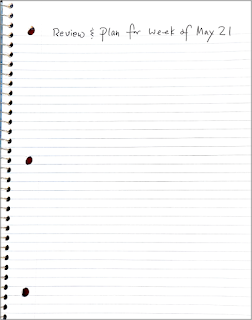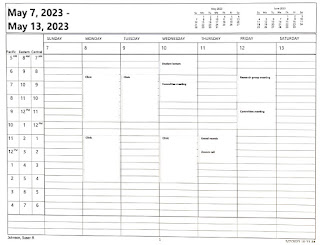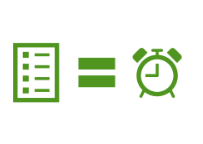"It is surprising how much I can get done when I take enough time for planning, and it is perfectly amazing how little I get done without it." ---Frank Bettger, How I Raised Myself from Failure to Success in Selling," 1947
Every productivity expert I know recommends spending time planning the coming week.
Yet few people do it.
Why? "Time."
Even the tiny amount of time required for a basic review, half an hour or so, seems like "too much" when you think you could be doing real work.
But there is a BIG payoff.
You have more things to do than you can do in the next week.
Making a plan helps you choose the right work to fit the available time. Having personally experienced the tremendous benefits of this process, I want you have those too.As with most new habits and routines, starting simply is key.
So here is a simple "stripped down" weekly review and planning process that I hope you will be inspired to try,
Get a sheet of paper and at the top, write "review & plan for week of <date>."
So here is a simple "stripped down" weekly review and planning process that I hope you will be inspired to try,
Get a sheet of paper and at the top, write "review & plan for week of <date>."

Open up your calendar in week view.

Look at each scheduled event for each day, and ask, "Do I need to do anything to prepare for this?
If there is, add it to your sheet of paper.
For example, from my review this week: "Find directions to the room at the hospital for the Tuesday presentation, and copy my slides to a thumb drive to take as backup."
When you are done with Monday - you guessed it! - look at Tuesday and on through the week.
Now look at the next 3 weeks (or farther out if you like),
Scan for upcoming deadlines, big meetings, or other events that you should start preparing for in the coming week.
If there is, add it to your sheet of paper.
When you are done with Monday - you guessed it! - look at Tuesday and on through the week.
Now look at the next 3 weeks (or farther out if you like),
Scan for upcoming deadlines, big meetings, or other events that you should start preparing for in the coming week.
If there is, add it to your sheet of paper.
For example, several years ago, I found a trip scheduled for two weeks hence and discovered that I had no plane tickets.
Gather all the places where you store "to do's."

The "places" could include task lists, a whiteboard, a notebook or legal pad, a bunch of post-its, notes on your calendar or phone app, or your email inbox.
If that sounds complicated, think about starting a master task list, and then you only have to "gather" one thing🙂.
If you store things in your memory😞 get a second piece of paper, and spend a few minutes writing them down.
Read each item from each location.
For each, ask "Is this something I should complete or start to work on this week"?
Gather all the places where you store "to do's."

The "places" could include task lists, a whiteboard, a notebook or legal pad, a bunch of post-its, notes on your calendar or phone app, or your email inbox.
If that sounds complicated, think about starting a master task list, and then you only have to "gather" one thing🙂.
If you store things in your memory😞 get a second piece of paper, and spend a few minutes writing them down.
Read each item from each location.
For each, ask "Is this something I should complete or start to work on this week"?
If it is, add it to your sheet of paper.
If an item will take an hour or more, consider putting an "appointment with yourself" on your calendar, or what is now commonly referred to as a time block.
That's it.
If an item will take an hour or more, consider putting an "appointment with yourself" on your calendar, or what is now commonly referred to as a time block.
That's it.
Now you have a list of things to do for the week that are likely to be more important than the method of picking at random throughout the day.
If you would like to order the tasks on the paper by priority, please do. If you have run out of juice, don't.
Instead, just select the tasks that you want to do on Monday. Keep the list short - you can always do more if you have time. Repeat that selection process every day. (For help, see The daily task plan: how to pick your MIT's).
Will you get them all done? Possibly not.
Actually, probably not. But as you repeat this process over time you will get better and choosing a more realistic amount of work to fit the available time.
There are other things you can add to make your plan even more effective, but that's for another day.

